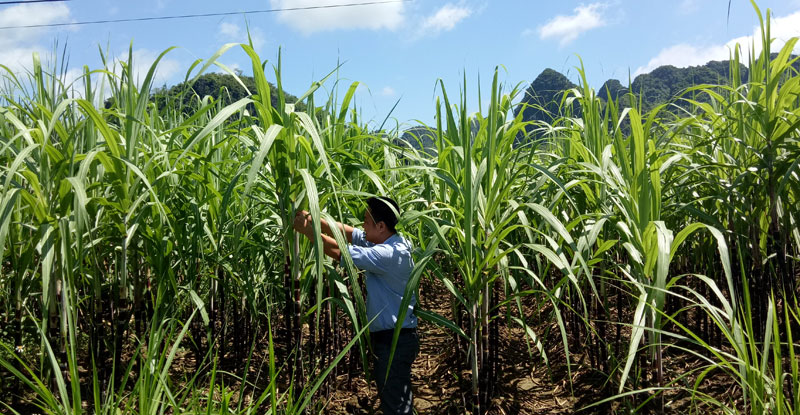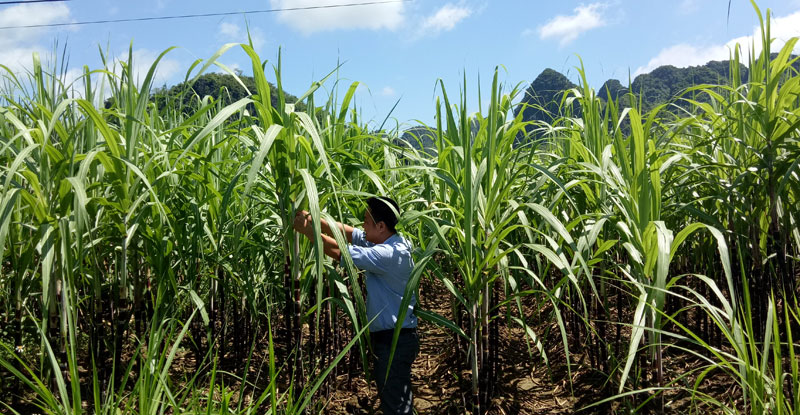
(HBO)- With the goal of supporting the poor and the policy beneficiaries to develop economy and ensure the social security, the preference capital of the Government through Social Policy Bank has played an important role and has always accompanied with people in Yen Nghiep commune (Lac Son) in recent years.

People in Yen Nghiep commune (Lac Son) invest
in growing purple sugarcanes for an average income of 150 million VND a
hectare.
In order for people to have access to capital
from the Social Policy Bank, the commune has built 17 savings and loans teams.
In particular, the Women's Union manages 5 teams, the Farmer Association
manages 5 teams, the Veterans Association manages 2 teams and the Youth Union
manages 5 teams. The savings and loans teams all have the balances of savings
accounts of over 430 million VND. In addition, the commune has implemented 7
policy credit programs with the total debt of 14,623 million VND, without
overdue debts. The good management and promotion of the effectiveness of policy
capital has created a safe, effective and reliable capital channel, credit and
policy management. Through the entrusted activities of the Social Policy Bank,
the social organizations in the commune have paid more attention to the
members. The content of the Association's meetings is richer, integrating to
implement other political tasks. In the group meetings, beside the information
on new policies and guidelines of the bank, the members also share production
experience, creating high community and confidence for members in the teams.
The chairman of Yen Nghiep People's Committee
Bui Van Chuong says that it can be affirmed that the State's preference capital
source has helped people to have conditions to develop production, get rid of
poverty and improve the quality of life. The households have access to
preference credit programs for the poor households and the policy beneficiaries
use them for the right purposes, promoting their effectiveness. This is one of
the helpful credit channels supporting the commune to reduce the poverty,
creating opportunities for people to promote and exploit the potentials and
advantages for economic development. By the end of 2018, the commune's per
capita income reached 32 million VND a year, the rate of poor households was over
11%.
According to data from the Hoa Binh Provincial Party Committee, the industrial production index for the first six months of 2025 is estimated to have increased by 20% compared to the same period last year. This marks the highest year-on-year growth rate for this period since 2020.
In the first six months of 2025, Hoa Binh province’s export turnover was estimated at 1.145 billion USD, marking an 18.11% increase compared to the same period in 2024. Import turnover was estimated at $ 804 million, a 17.15% increase, which helped the province maintain a positive trade balance.
The lives of the ethnic minority farmers in Tan Lac district have gradually improved thanks to the new directions in agricultural production. This is a testament to the collective strength fostered through the professional associations and groups implemented by various levels of the district’s Farmers’ Union.
With the motto the "product quality comes first,” after nearly one year of establishment and operation, Muong village’s Clean Food Agricultural and Commercial Cooperative, located in Cau Hamlet, Hung Son Commune (Kim Boi district), has launched reputable, high-quality agricultural products to the market that are well-received by consumers. The products such as Muong village’s pork sausage, salt-cured chicken, and salt-cured pork hocks have gradually carved out a place in the market and they are on the path to obtaining the OCOP certification.
In the past, the phrase "bumper harvest, rock-bottom prices" was a familiar refrain for Vietnamese farmers engaged in fragmented, small-scale agriculture. But today, a new spirit is emerging across rural areas of Hoa Binh province - one of collaboration, organisation, and collective economic models that provide a stable foundation for production.
Maintaining growing area codes and packing facility codes in accordance with regulations is a mandatory requirement for agricultural products to be eligible for export. Recently, the Department of Agriculture and Environment of Hoa Binh province has intensified technical supervision of designated farming areas and packing facilities to safeguard the "green passport" that enables its products to access international markets.



